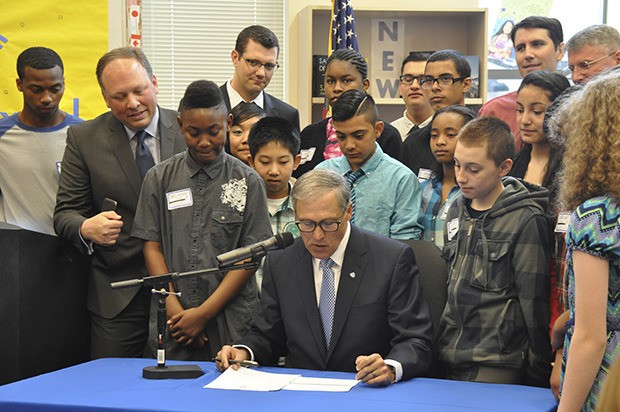Salome Molia, an eighth-grader at Mill Creek Middle School, hopes to be the first in her family to earn a four-year college degree.
Thanks to the College Bound scholarship program, she may get that opportunity.
The program, created in 2007, is an early commitment of state financial aid to eligible students who sign up in seventh or eighth grade and fulfill program requirements, which include graduating from high school with 2.0 GPA or higher, maintaining good citizenship, completing FAFSA and enrolling in a state college within one year of graduating from high school.
Gov. Jay Inslee visited Mill Creek Middle School on Tuesday to sign legislation that improves aspects of the College Bound program, including data collection, outreach and program outcomes.
Mill Creek was chosen for the bill’s signing because of the school’s success in registering eligible students for the program. In 2013, 335 Mill Creek students – 95 percent of those eligible – enrolled, and in 2014, 306 students signed up – 97 percent of those eligible.
“Now we have to make sure that all over Washington state middle school students and families will be able to plug into this same vision,” Inslee said before signing the bill. Inslee was joined by a dozen Mill Creek students in the College Bound program, including Molia, who spoke before the bill was signed about what the program means to her.
“My family is one of the reason why I would like to graduate from college,” she said. “I am glad to have a College Bound scholarship so that it will help me to hopefully have the honor to be the first graduate in my family to graduate from a four-year college. I am also glad to have the scholarship because it will help me to be who I want to be.”
Molia wants to attend Washington State University and become a real estate agent.
She is grateful for opportunities the College Bound program provides.
“I know that this scholarship will benefit other students who are like me financially,” she said. “If it can help me, then I know that it will help others. It should give people the chance to achieve their personal goals in life. … Everybody deserves to get help to grow their education, and College Bound can be that help.”
Inslee said the program helps students succeed in high school.
“When a student signs up for the college bound program they bind themselves to an optimistic vision of their own future,” he said. “That is why this is such an incredibly successful program.”
In the 2014 class of College Bound, 75 percent of students graduated high school compared to 62 percent of their low-income peers who were not enrolled in the program.
“I believe one of the most important things we can accomplish is helping get kids to graduate from high school,” Inslee said.
But he also recognized the importance of higher education.
“It’s not just about finishing high school,” he said. “More of Washington students need our support to access post-secondary education and technical college, and that is what we are about. Ultimately we know that a thriving economy in our state is dependent on our success in these type of efforts, so we have got to do a better job and this is the first step to do that.”
Mary Jean Ryan is the executive director of the Community Center for Education Results, which oversees the Road Map Project, an effort geared toward doubling the number of students in the region who seek post-secondary eduction by 2020 and closing racial and ethnic gaps in accessing education.
She said the College Bound scholarship is a “game changer.”
“When you think about the kids, the eighth-graders in this school, what a great thing that when they leave here – soon – to go on to high school, they’ll walk in to high school knowing that they have a college scholarship waiting for them when they graduate from high school,” she said. “But money is not the only thing that matters. It is also the support. That is why this bill is so critically important. It’s the extra guidance. It’s information. Parents really need better information on how to help their children all those years through high school, and the kids themselves need better information what classes to take, how to apply.”
Senate Bill 5851, sponsored by Sen. David Frockt, D-Seattle, was based on recommendations from a bipartisan work group that studied the College Bound program over the summer of 2014.
Talk to us
Please share your story tips by emailing editor@kentreporter.com.
To share your opinion for publication, submit a letter through our website https://www.kentreporter.com/submit-letter/. Include your name, address and daytime phone number. (We’ll only publish your name and hometown.) Please keep letters to 300 words or less.

